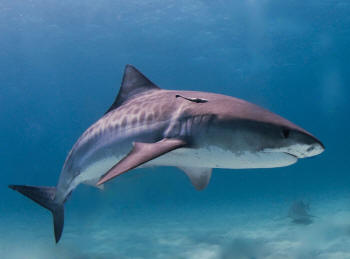Interactions
The whitetip reef shark is a carnivore, preying upon other fish and crustaceans in order to get food. Its specialty is hunting creatures that live on the bottom of the ocean, such as octopus, lobsters, and crabs. This shark also hunts several types of bony fishes, such as eels and parrotfish, but only when it can find these animals inside the caves and crevices where it usually hunts.
Whitetip reef sharks are nocturnal hunters, becoming more and more active as the sun goes down. Again, since they are primarily bottom-feeders, they search for their prey among the crevices in the coral and rocks. When prey is found, the shark will chase whatever animal it is into a crevice, wedging its head in the entrance so the animal can’t escape. It’s only a matter of time, then, until the shark comes away victorious.
These sharks have been observed hunting both in packs and solo. When in packs, they sweep over the surface of the reef, using their larger numbers to flush prey out from hiding. Again, this pack hunting behavior only occurs at night.
Though the whitetip reef shark is a predator, it is relatively
small in size compared to some of the larger carnivores on the reef.
Two of its primary predators are the tiger shark – Galeocerdo
cuvier, which can reach sixteen feet in length – and the giant
grouper – Epinephelus lanceolatus, which can grow to be ten feet
long.
it is relatively
small in size compared to some of the larger carnivores on the reef.
Two of its primary predators are the tiger shark – Galeocerdo
cuvier, which can reach sixteen feet in length – and the giant
grouper – Epinephelus lanceolatus, which can grow to be ten feet
long.
According to the study “The sea louse Lepeophtheirus acutus (Caligidae, Siphonostomatoida, Copepoda) as a pathogen of aquarium-held elasmobranchs,” the whitetip reef shark can also serve as a host for several different bacteria and parasites. This particular study demonstrates that the sea louse observed can attach itself to the eyes and mouth of the reef shark, impeding vision and eating. In addition, the whitetip reef shark can also be a host for the parasite called Paralebion elongates, a copepod found in Hawaiian waters.
This shark is actually fairly harmless to humans. Some have even been known to accept offers of food from the hands of human divers. However, for the most part, they stay away from human contact, swimming in the opposite direction when approached.
This is most likely why the whitetip reef shark is fished commercially in the waters off Pakistan, India, Sri Lanka, and Madagascar: because it poses no real threat to humans besides a relatively small bite. Data on this fishing is sketchy at best, so it’s most likely fished in other areas of the world as well. The sharks are mostly fished for their livers and flesh, though both have been known to cause poisoning in rare cases.
| Home | Facts |
